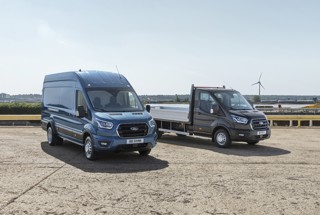 Author: Andy Picton, chief commercial vehicle editor, Glass’s (pictured)
Author: Andy Picton, chief commercial vehicle editor, Glass’s (pictured)
May 2021 was another record-setting month for light commercial vehicle (LCV) registrations with 29,354 new vehicles appearing on UK roads for the first time. This was the best May performance on record.
Registrations were up 289.3% versus the lockdown impacted May 2020 and up 4.7% on pre-pandemic levels.
The main drivers for this level of LCV demand are from increasing home delivery vehicles and essential service delivery vehicles.
Breaking down the results highlighted huge increases for all sectors.
Demand for vans under 2.0 tonnes rose by 384.2% whilst registrations in the between 2.0-2.5 tonne and 2.5-3.5 tonne sector improved by 294.7% and 263.8% respectively.
The Pickup sector also recorded a 381.8% increase.
Ford secured a strong month with four of its product ranges in the top 10.
The Ford Transit Custom was crowned best-selling van in the UK in May, with its big brother, the Ford Transit in second place.
The Ford Ranger and Ford Transit Connect were in 7th and 8th place respectively.
The Stellantis Group also returned a positive month with the Vauxhall Vivaro, Citroen Berlingo and Peugeot Partner all positioned in the top 10.
Year-to-date growth has witnessed demand across all vehicle sectors, with registrations 99.3% higher than the same point last year.
A total of 157,150 registrations reflects a market that is 4.0% up on the pre-pandemic five-year average.
Year-to-date, Ford dominates the top ten registration results, with the Transit Custom, Transit, Transit Connect and Ranger making up over 50% of the total registrations.
Top five LCV registrations
|
YTD 2021 |
May 2021 |
May 2020 |
|||
|
Ford Transit Custom |
22,963 |
Ford Transit Custom |
4,065 |
Ford Transit Custom |
903 |
|
Ford Transit |
14,636 |
Ford Transit |
2,401 |
Mercedes-Benz Sprinter |
899 |
|
Volkswagen Transporter |
9,909 |
Volkswagen Transporter |
1,872 |
Vauxhall Vivaro |
653 |
|
Mercedes-Benz Sprinter |
9,746 |
Vauxhall Vivaro |
1,801 |
Ford Transit |
580 |
|
Ford Ranger |
8,054 |
Mercedes-Benz Sprinter |
1,597 |
Mercedes-Benz Vito |
384 |
Pandemic and semi-conductor shortage
The effects of the pandemic continue to distress the automotive industry.
Further lockdowns and Covid restrictions in many European countries, continue to affect vehicle producing nations and the wider supply chain.
Ongoing semi-conductor, steel, rubber and even wood shortages continue to compound the situation.
With this fragile supply chain expected to last into 2022, there is still some way to go before the industry returns to normal.
The last year has proved that the commercial vehicle sector is resilient to the changing world.
However, with the LCV parc now at 4.6 million, the Government needs to incentivise fleets to make the switch away from diesel and into electric and hydrogen vehicles.
May used Light Commercial Vehicle (LCV) overview
Driven by increasing demand for retail-ready LCVs, May has seen the used market remain strong, with first-time conversion rates increasing 1.1% to 87.4%.
The limited numbers of sub-2-year old stock in May continues to drive trade buyers and franchised dealer groups to pursue the best examples, ensuring prices have remained strong.
Although remaining strong, the average all-age sales price was down £350 versus April and at its lowest since January this year.
With the SMMT reporting another strong new registration month in May, there is hope that vehicle de-fleets will start to find their way into the wholesale market.
Although this will improve the supply of stock into the used market, there are still delays for new vehicles entering the UK.
As a result, used prices look set to remain high for the remainder of the year.
May in detail
Glass’s auction data shows the overall number of vehicle sales in May decreased by 1.76% versus April 2021, but recorded a 218.2% increase over twelve months ago.
Average sales prices paid in May decreased by 3.77% versus April but remain 23.27% higher than the same point last year.
The average age of sold stock increased from 69.0 months in April to 75.3 months in May and is 15.9 months older than the same point last year.
Average mileages have reduced month on month, falling from 81,487 miles in April to 78,819 miles in May (-3.28%).
The latest average mileage is 13,061 miles (+16.58%) higher than in May 2020.
Glass’s continues to monitor the LCV market closely and has an open dialogue with auction houses, manufacturers, leasing and rental companies, independent traders and dealers as well as the main industry bodies.
This information, combined with the wealth of knowledge in our CV team ensures Glass’s valuations remain relevant in the marketplace.




















Login to comment
Comments
No comments have been made yet.